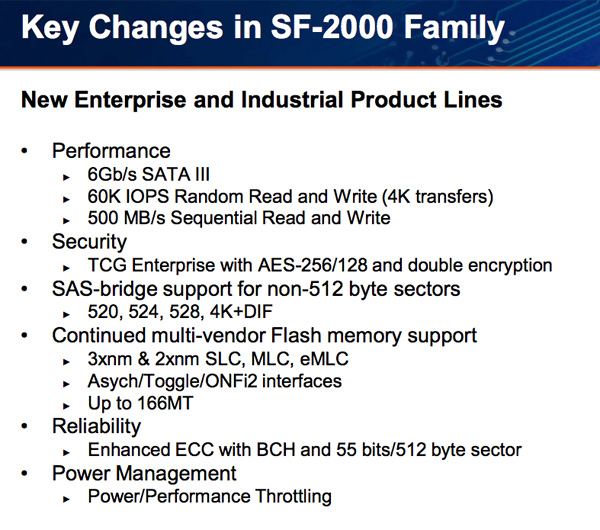OCZ'z Vertex 3 Pro Demo: World's First SandForce SF-2000
by Anand Lal Shimpi on January 5, 2011 9:37 PM ESTA few months ago SandForce announced its second generation SSD controller: the SF-2000 series. The specs SandForce released at the time were almost too good to be true. As a refresher here’s what we saw back in October of last year:

SandForce is promising a single enterprise level drive that can deliver 500MB/s sequential reads and writes (for highly compressible data), and up to 60K IOPS for 4KB random reads and writes. That’s not an evolutionary improvement, that’s more than a doubling of what most of the competition can do today. Even compared to existing SandForce drives it’s a huge increase in performance. But as I’ve heard many times before, anyone can put out a promising PDF.
Today at CES, OCZ previewed its first SF-2000 based drives: the Vertex 3 Pro and Vertex 3 EX. Both are based on SandForce’s SF-2582 controller, the highest end offering in the SF-2000 family. The drives won’t see the light of day for months (sometime in Q2) and what OCZ is showing today is very, *very* early silicon and hardware. The drives are using 32nm Toshiba toggle-mode NAND (effectively DDR NAND), however OCZ will go to market with 25nm Intel NAND when the drive is ready.
First let’s look at the specs OCZ is promising for these drives:
OCZ’s specs are even higher than SandForce’s. This is getting ridiculous. Thankfully, OCZ let me run some of my own Iometer tests on the drives to verify the claims. Surprisingly enough, the Vertex 3 Pro looks like it’s really as fast as OCZ and SandForce are claiming. When running highly compressible data (pseudo random in Iometer) at low queue depths, I get 518MB/s sequential write speed and nearly 500MB/s for sequential read speed. Remember this is the very first version of the drive and there’s months of tweaking ahead to get it ready for production. Performance may even increase by the time OCZ actually ships the drive. Furthermore, this is the performance of a single drive with a single controller - there’s no funny on-board RAID going on, we’re just talking about the performance of a single drive.
| OCZ Vertex 3 Pro Preliminary Test Data | ||||
| Iometer 2010 Test | Incompressible Data | Compressible Data | ||
| 128KB Sequential Write (QD=3) | 262.MB/s | 518.2MB/s | ||
| 128KB Sequential Read (QD=3) | 493.4MB/s | 492.3MB/s | ||
| 4KB Random Read (QD=3) | 186.5MB/s | N/A | ||
| 4KB Random Write (QD=3) | 162.7MB/s | 227.0MB/s | ||
Even if we look at incompressible data (fully random), the performance is unbelievable. You get better minimum performance on the SF-2582 than peak performance on the SF-1200/SF-1500. Note that we couldn't run all of our tests given the very early nature of the hardware sample. The fact that we could get these numbers at all on the first beta of the drive was beyond impressive.
Obviously to hit these speeds you need a 6Gbps controller. Thankfully there are at least a few ways to get those ports.
It’s looking like SandForce will be last to bring out their next-generation drive in the first half of the year with both Micron and Intel beating it to the punch, but if we can get this sort of performance, and have it be reliable, it may be worth the wait.


















62 Comments
View All Comments
juhatus - Thursday, January 6, 2011 - link
of course you can.Requires you to goto all the way to bios thou.. think server's all booting from the of pcie-cards as long as there's been pcie.
vol7ron - Thursday, January 6, 2011 - link
Let's stop using the word/acronym "BIOS" and start using the term "UEFI" :)UNHchabo - Thursday, January 6, 2011 - link
There's a problem with that though: phonetics.It's easy to say BIOS: buy-ose. How are you supposed to pronounce "UEFI"?
I suppose "you-fee" may work, but that "E" complicates things. Maybe we could try ü-fee?
Spivonious - Thursday, January 6, 2011 - link
Ha, I like üfee. Best spoken with an Ahnold voice.Taft12 - Thursday, January 6, 2011 - link
Not a very good option on S1156. Fail chipset from Intel FTL :(IanWorthington - Thursday, January 6, 2011 - link
I assume that 1GB/s is sequential i/o? Would love to see the 4kb random speed.ajp_anton - Thursday, January 6, 2011 - link
It's all there in the graph. 4kB is about 200MB/s both directions.ZippoMan - Thursday, January 6, 2011 - link
Really? Q2? Damn. It will be interesting to see the C400/M4 face off with the Vertex 3.cactusdog - Thursday, January 6, 2011 - link
The C400 is crapola. Comes no where near the vertex3vol7ron - Thursday, January 6, 2011 - link
Remember the V3 is using an enterprise SSD controller. More expensioso